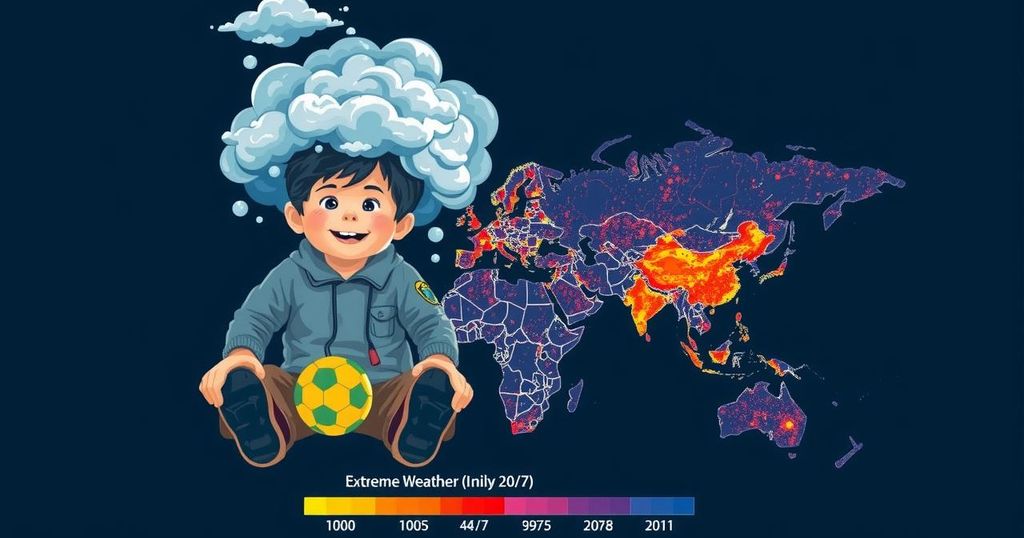One in Eight Children Affected by 2024’s Extreme Weather Events – Save the Children

Save the Children reports that about one in eight children globally have been severely impacted by extreme weather events this year, leading to displacement and educational disruptions for 300 million children in Asia, Africa, and Brazil. As COP29 approaches, the organization calls for prioritization of children’s rights in climate actions, highlighting urgent humanitarian needs and the ongoing climate crisis’s unequal effects.
A recently released report by Save the Children reveals that approximately one in eight children worldwide have been profoundly affected by the ten most severe extreme weather events that transpired this year. From January 1 to October 29, around 300 million children, equivalent to 12.5% of the global child population of 2.4 billion, faced disruptions due to extreme weather events, including storms, droughts, and floods across Asia, Africa, and Brazil. Among the most notable incidents were Tropical Storm Trami, which led to the suspension of schooling for 19.5 million children in the Philippines; drought in Southern Africa, affecting 12.2 million children; and widespread flooding in West and Central Africa, displacing over 10 million children from their educational institutions. Furthermore, the unprecedented heatwave in South Asia impacted 256 million children, underlining the increasing severity and frequency of climate-related disasters, which according to the World Meteorological Organization, have surged five-fold in the last fifty years. As global leaders prepare for the COP29 climate summit in Azerbaijan, the findings underscore a critical need for children’s voices and unique vulnerabilities to be prioritized in climate change response strategies. The majority of affected children hail from low- and middle-income nations, intensifying the urgency for their experiences to inform global actions. In narratives shared by affected children, like Kyariyam from Nigeria, who expressed her traumatic experience due to flooding that rendered her homeless, and Zinhle from Zimbabwe, who illustrated the dire food shortages from drought, the personal consequences of climate change are stark. These testimonies reflect the broader humanitarian needs for educational resources and support within devastated communities. Save the Children emphasizes that without addressing the specific needs of these vulnerable populations, the goal of safeguarding children’s rights amidst this climate crisis remains unattainable. Calls for more inclusive climate finance and adaptation plans that consider children’s rights are paramount as discussions commence at COP29. The organization reiterates that this crisis should be recognized not just as an environmental issue but as a profound challenge to child rights globally. In conclusion, this year’s extreme weather events have drastically affected millions of children, highlighting a pressing need for immediate action to prioritize their needs and rights within climate change frameworks. The increasing trend of climate extremes necessitates a recalibration of global discussions to ensure the protection and future of the world’s vulnerable youth.
The significance of this report lies in its timely exploration of the escalating impact of climate change on children, who are often the most vulnerable during extreme weather events. With the ongoing COP29 summit discussions set to occur in Azerbaijan, the findings draw attention to the necessity of integrating children’s voices into the climate change narrative. Historically, children have been overlooked in climate policies despite being disproportionately affected, as expressed through their experience in numerous countries plagued by disasters.
In summary, Save the Children’s report underscores the critical impact of extreme weather on children, revealing a concerning global trend that requires urgent attention. The testimonies from affected children serve as a powerful call to action for world leaders at the COP29 summit, advocating for the incorporation of their rights and needs into climate policy and humanitarian responses. Failure to act may perpetuate the cycles of poverty and vulnerability among the world’s youth amid a rapidly changing climate.
Original Source: reliefweb.int







